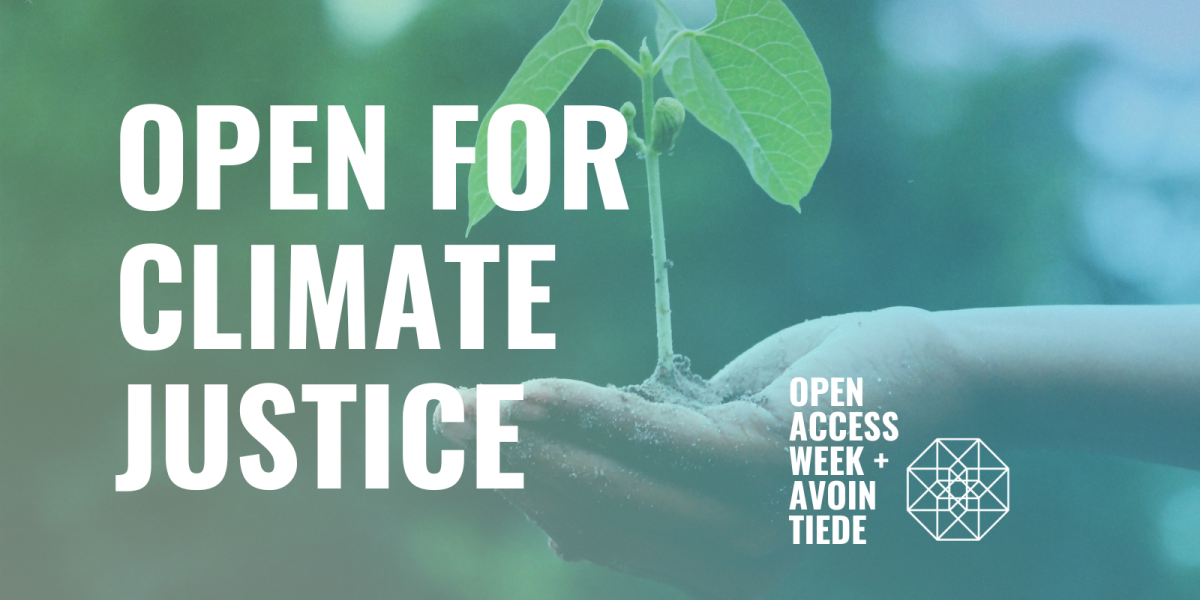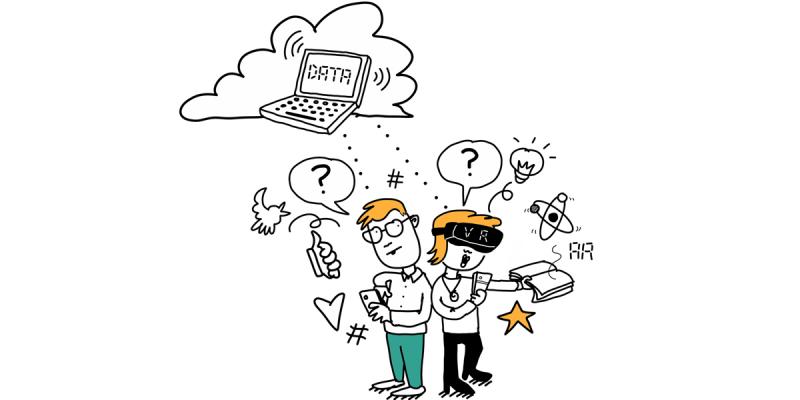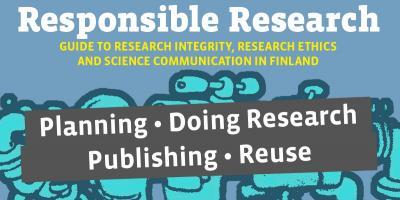
The 2022 Open Access Week brings perspectives on the encounters of climate justice and open science to the Open Science website.
The theme of the 2022 International Open Access Week is Open for Climate Justice. Climate justice refers to the aim of reducing the concentration of negative effects of climate change to certain areas and groups of people. The question of climate justice highlights the current situation in which the consequences of the climate crisis are not equally shared, but political power relations have an impact on the effects of environmental change on the capabilities of different communities and population groups to pursue a safe and sustainable life.
In addition, there are large differences between different population groups in terms of the possibilities of producing, disseminating and making use of information related to the climate crisis. How can one justify the fact that one community gains more knowledge and capacity to face a global crisis than another? Open science democratizes science by giving a more diverse group of researchers the opportunity to conduct research, making it easier for decision-makers and citizens to have access to researched information, and by providing opportunities for non-researchers to participate in the production of research-based knowledge.
Whose climate science?
Climate change and the ecological and socio-political causes and consequences associated with it are the subject of continuous research. The global scientific community from physics to arts has taken action to find answers to curb the crisis and adapt to the changes it causes. However, it is useful to ask who currently has the opportunity to produce and make use of information about the climate crisis.
One aspect that raises questions about the production and usability of research data related to the climate crisis is the publication language of research. Especially in science, most publications operate in English. Thus, exclusive, paid, and foreign science limits citizens’ ability to make decisions based on current research. In Finland, basic education, and the extent of information technology offer a large part of society the opportunity to access research knowledge in some form. However, much of the research on climate change is unattainable for those not fluent in academic English. Janne Pölönen, Secretary General of the Publication Forum, of the Helsinki-initiative on Multilingualism in Scholarly Communication emphasizes the importance of multilingual science communication: “The effectiveness of even the most international science requires multilingual and diverse scientific communication in order to reach decision makers, professionals and the general public, and to increase scientific capital. Multilingualism is the lifeblood of open science.”
Openness and popularization enable national resources
The opportunity for citizens to raise critical questions and discuss topical issues is a key part of a democratic society. In mitigating climate change, civic activism also plays a major role in society.
Many NGOs rely heavily on scientific research and contribute to a wider debate on science. However, scientific research, particularly in relation to the climate crisis, is often less accessible to citizens than for professionals in the field. Esko Turunen, Professor of Mathematics at the University of Tampere, and a member of the Coal-Free Finland campaign, says that even higher education activists often encounter difficulties in understanding scientific research related to the climate crisis: “The problem is that the available scientific information is very science-specific and has not been written to the general public.”
If research data is properly understood by specialists alone, it does not reach decision-makers and citizens sufficiently. “In a democratic society, decision-making must be based on scientific, researched knowledge produced by the scientific community. When citizens choose decision-makers, this researched information must be available in such a form that common people understand it," Turunen emphasizes. He further underlines climate change and the use of fossil fuels as a social, not just a technical, issue that makes science in all fields necessary, preferably in an open and accessible format: “For us environmental activists, this applies to almost all disciplines; not only environmental science, but also technology, social sciences and economics, biology and medicine."
“In a democratic society, decision-making must be based on scientific, researched knowledge produced by the scientific community. When citizens choose decision-makers, this researched information must be available in such a form that common people understand it.”
Turunen suggests solutions to focus on greater comprehensibility in the structures of publicly funded research: “When research is funded in Finland, one of the criteria for research, or at least for publicly funded research, should be to actually invest in making the results translated as far as possible into the understanding of ordinary people.”
Turunen proposes to include popularization to the publication phase of the study: “Every time a research result comes, it would be said to have a one-page explanation of what it says in concrete terms about the essence of what the research has said about this matter." With reference to his experience gained through activism, Turunen says that a good way to bring scientific research to the wider public is to ask very concrete questions from experts in the field during discussion sessions for the general public.
However, also through his own research experience, Turunen recognises that scientific research is not an easy task. Yet it is inevitable to invest in achieving a fair and democratic society and decision-making.
Openness still requires a common set of ground rules
According to Salla Rantala, Head of Development of the Environment Policy Centre of the Finnish Environmental Institute, there is a strong spirit in Finland and at EU level that citizens should have access to common environmental information and openness increases inclusion in environmental legislation.
However, it is once again justified to ask who produces and maintains research data and who can access it. When the data is opened, the control of the data is partly removed from the original operator. Opening up data involves power and capacity issues, as different actors have very different capacities to utilize open data. Thus, for example, expectations that open data will automatically contribute to equality are not always realized. “The fact that we get new types of economic benefits through open data can actually strengthen certain unequal positions,” Rantala says. For example, when considering the relationship between indigenous peoples and digital data, Rantala says that consideration should be given to what kind of data is produced and in what form. ”Data in the form as an academic researcher articulates it and uses it is unlikely to be even very relevant to indigenous peoples, because they may not define its values in the same way.”
On the other hand, open environmental data has also revealed abuse, such as deforestation in prohibited areas, and even environmental crimes. The relationship of open data to sustainable development therefore includes both pitfalls and opportunities. However, with the help of common ground rules, it is possible to ensure equality and the effective pursuit of the goals of sustainable development.
Climate justice is not the goal of the future, but the necessity of today
Research-based knowledge has power. Covid-19 has shown that research data can be shared across borders and payment walls in times of global crisis. Opening up information partly made it possible to reach solutions to the situation. It is a triumph of science, and especially of open science, which forces us to ask whether we can afford not to use resources such as openness when we seek solutions to other crises that threaten the security, balance and sustainability of our societies. The climate crisis is an extremely complex phenomenon, the solutions of which require the efforts of all disciplines and actors such as civic activism and social sectors. However, it is required for knowledge to reach people and societies on a wide scale in order to be effective.
The dissemination of knowledge requires multilingual science communication, popularization and a common set of ground rules to diversify scientific debate and find solutions to societal challenges. Open science creates opportunities for a more diverse solution field. In addition, at its best, responsible openness dismantles unequal power structures related to science and further diversifies scientific debate.
For the article, an activist and professor Esko Turunen was interviewed, a comment was requested from Janne Pölönen, Secretary General of the Publication Forum, and a previous interview was used from Salla Rantala from the Finnish Environmental institute (SYKE).
Interview: Anni Rastas
Text: Jonni Karlsson & Anni Rastas
The article is part of the Open Science + Open for Climate Justice series of the Open Science Secretariat and the International Open Access Week. In addition to the article series, the social media accounts of the Open Science Secretariat make social media posts from the content of the article series during the week

